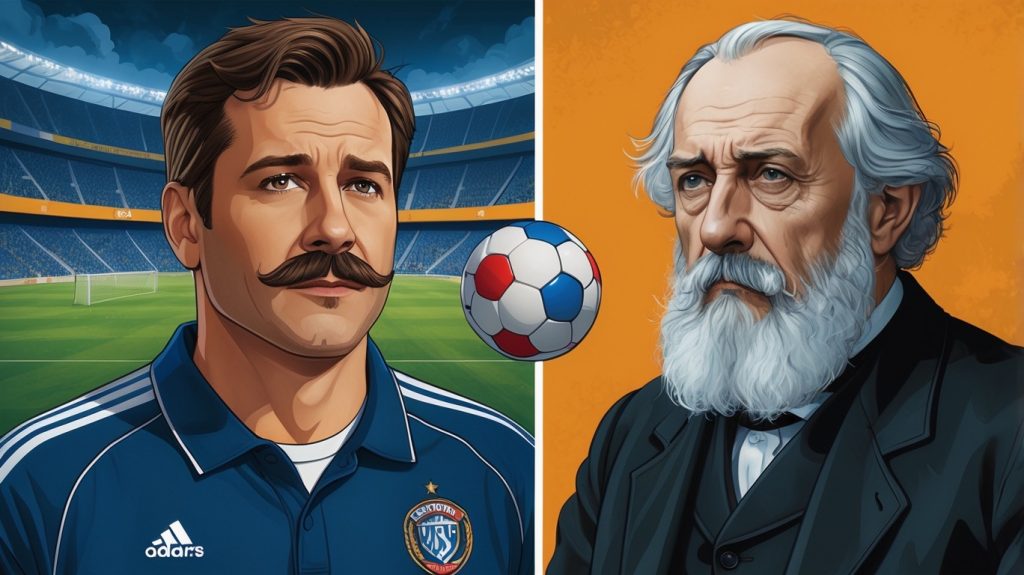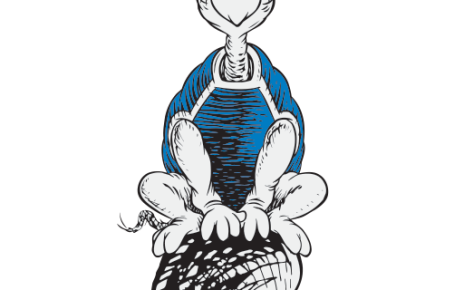By Sean Dempsey, 03/23/25
“The main idea of the novel is to depict the positively good man. There is nothing more difficult than this in the world, especially nowadays… the task is immeasurable…”
– Fyodor Dostoevsky
In the intricate interplay of characters and their societal backdrops, the portrayal of characters imbued with an almost divine goodness set against flawed societal systems offers profound insights into the human condition. I’d like for a moment to delve deep and contrast Fyodor Dostoevsky’s “The Idiot” against the highly popular new AppleTV series “Ted Lasso.” By doing so, I seek to highlight how these two works reflect the moral and cultural ethos of their respective eras through their protagonists — and also explore how they reflect the philosophical transitions from modernism to metamodernism.
Dostoevsky’s The Idiot, written during a time when Europe was grappling with the effects of the Enlightenment and the Industrial Revolution, introduces Prince Myshkin, a character whose purity and idealism starkly contrast with the burgeoning cynicism and decay of the society he enters. Myshkin, often described as a ‘Christ-like’ figure, returns to Russian society imbued with innocence and altruism, only to find himself ensnared in a web of jealousy, betrayal, and manipulation. This novel, emerging from the modernist ethos, underscores a deep skepticism about the human capacity for genuine goodness in a rapidly modernizing world. Dostoevsky’s exploration of Myshkin’s plight is a profound commentary on the existential crises and moral disintegration of his time.
On the other hand, Ted Lasso, created by Jason Sudeikis and Bill Lawrence, emerges as a striking contrast. Set in contemporary society, the series features Ted Lasso, an American football coach (the one with a pigskin) hired to manage a British soccer (“football”) team. He must navigate his new role with unrelenting optimism and folksy wisdom.
Unlike Myshkin, Ted’s innocence does not lead to his downfall but instead becomes a transformative force within the cynical environment of the soccer team he coaches. This portrayal aligns with metamodernism, which seeks to reconcile the irony and skepticism of postmodernism with a return to the earnestness and grand narratives associated with modernism.
The creators of Ted Lasso harness this blend to challenge the prevailing cynicism of contemporary culture, suggesting that sincerity and kindness can indeed lead to positive change.
The Contrasts Reveal a Lot about Shifting Cultural Epochs
In The Idiot, Prince Myshkin’s interactions with figures like Rogozhin and Nastasya Filippovna illuminate the destructive power of societal corruption and personal vices. His tragic narrative arc, where his attempts at doing good ultimately lead to misunderstanding and chaos, reflects Dostoevsky’s critique of a society that seems to punish purity and reward cunning. Myshkin’s ultimate psychological breakdown is a powerful testament to the modernist view of the individual’s impotence in effecting positive change within a corrupt system.
Let’s compare this with Ted Lasso’s impact on his environment. Ted’s relationship with characters such as Rebecca Welton, Roy Kent, and Jamie Tartt showcases how his optimistic and empathetic approach gradually transforms their lives. For instance, Rebecca, initially motivated by revenge against her ex-husband, finds new purpose and begins to lead with kindness herself, inspired by Ted’s example. Similarly, both Roy and Jamie evolve from being self-centered to team-oriented individuals, influenced by Ted’s belief in their better selves.
The metamodern elements of Ted Lasso extend beyond the characters and into the very fabric of the narrative, which actively engages with themes of redemption, community building, and the genuine complexity of human emotions. This approach not only provides good entertainment but also serves as a cultural critique and a form of philosophical inquiry into the nature of goodness and the potential for human growth.
Reflecting on the Human Spirit Across Eras
Metamodernism, embodied in narratives like modern-day Ted Lasso, represents a vital philosophical framework, harmonizing the dichotomies of modernism’s assuredness and postmodernism’s skepticism through a synthesis that is particularly resonant with cultural and emotional complexities. This approach is not just theoretical but practical. Ted Lasso personifies this with his unwavering optimism and earnest sincerity in the face of brutal and sardonic environment. However, his ability to maintain hope and integrity, despite personal and professional challenges, offers a compelling narrative of metamodern resilience.
Again, Ted’s influence on characters like Rebecca Welton, who transitions from a vengeful, scheming team owner to a supportive and positive leader, demonstrate the transformative power of sincerity infused with awareness. This transformation is underscored by Ted’s motto, “Believe,” which, while simple, acts as a profound rallying cry for belief in personal and communal betterment. In short, it shows the metamodern blend of depth and accessibility.
The series masterfully oscillates between humor and serious themes, addressing complex issues such as mental health, personal growth, and the importance of community with a balance of levity and gravity. This juxtaposition of sincerity and irony—central to metamodernism—engages the audience on multiple levels, emotionally and intellectually enriching the viewer experience.
Moreover, Ted’s open handling of his vulnerabilities, such as his struggles with mental health and the complexities of his divorce, enrich his character and emphasize the metamodern theme of embracing one’s limitations while striving for emotional and ethical growth. This not only humanizes Ted but also inspires the characters around him to embrace their complexities and work towards a more harmonious and empathetic community.
To drive the point home, one does not observe this level of character evolution or “rubbing off effect” in Dostoevsky’s The Idiot. In fact, the exact opposite effect takes place and the vices of the ancillary characters wear down and eventually break the ever-present and inherent goodness of Prince Myshkin.
In a broader cultural context, I believe metamodernism offers a toolkit for navigating contemporary societal challenges by advocating for a synthesis of diverse perspectives and fostering a community-oriented approach to problem-solving. It encourages a middle path where sincerity complements irony, and hope tempers cynicism, providing a nuanced paradigm for understanding and addressing the global and interpersonal issues of the current century.
Through Ted Lasso’s narrative and its impact, metamodernism inspires a renewed belief in the potential for inclusivity, compassion, and collective progress, making it an essential perspective for contemporary times.
Final Thoughts
The divergent narrative trajectories of The Idiot and Ted Lasso highlight a significant cultural shift from the disillusionment characteristic of modernism (and also postmodernism) to the hopeful transcendence of metamodernism. While Dostoevsky’s work presents a bleak view of human nature and societal interaction, Ted Lasso offers a hopeful perspective on the potential for personal and communal evolution.
This exploration encourages a reevaluation of the roles of innocence and moral integrity in societal contexts. As one seeks to navigate the complex societal landscape around us, the metamodern promise in Ted Lasso might inspire us to believe in the possibility of a more inclusive and compassionate world, advocating for a future where the spirit of individuals like Ted Lasso helps guide our interactions and societal structures. Let us pray the Ted Lassos might positively influence all of us, rather than for us to inevitably taint the Ted Lassos (as Dostoevsky indicated is more likely to occur). That outcome would be a great strive forward towards metamodern synthesis.




